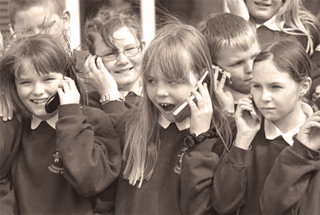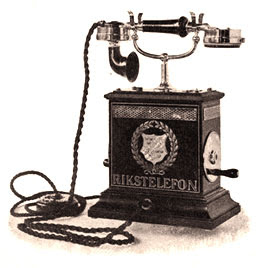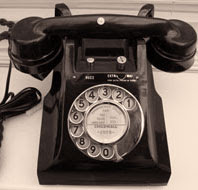For quite some time we have become accustomed to reading reports about our young people suffering from alcohol, drug and tobacco addiction. More recently gambling can probably be added to that list and now, according to a recent poll, eight out of every ten children are addicted to their mobile phones. 81% of those aged between six and seventeen claim to use it nearly six hours a day and it is their most valuable possession. They send and receive as many as 34 texts and make eight calls in an average day.
81% of those aged between six and seventeen claim to use it nearly six hours a day and it is their most valuable possession. They send and receive as many as 34 texts and make eight calls in an average day.
Did You Know? Every life form on our planet, the animals, mammals, fish, birds, insects and all plant life are dependant on some kind of communication for the survival of their species. The sun, the dark and daylight as well as the wind and tides all have their part to play. We humans have a big advantage in our ability to talk to each other and be understood but it doesn’t stop there. For us there are many different ways to communicate. Long after we had learned to talk to one another with some able to write, traders and explorers travelled to other lands and found goods and food hitherto unheard of. They learned and taught us how other peoples lived and sometimes had very different ways of doing things.
 The biggest breakthrough in communications for the human race came with the discovery of electricity. It allowed signals to be tapped out and sent across the world with the letters of the alphabet represented by dots and dashes or their equivalent. As well as all the advantages on land, ships at sea could now keep in touch and more important, send out distress calls. That was only a start. Telephone and wireless soon followed. It has taken little more than a hundred years to get where we are today with television and radio continually reporting from all over the world. Even our own personal phones give us immediate contact no matter how far away it is. The present generation is already moving quickly forward with even the youngest of our children mastering the art of communication through texts as well as emails and the internet. Who dares to think what the future holds in store for them?
The biggest breakthrough in communications for the human race came with the discovery of electricity. It allowed signals to be tapped out and sent across the world with the letters of the alphabet represented by dots and dashes or their equivalent. As well as all the advantages on land, ships at sea could now keep in touch and more important, send out distress calls. That was only a start. Telephone and wireless soon followed. It has taken little more than a hundred years to get where we are today with television and radio continually reporting from all over the world. Even our own personal phones give us immediate contact no matter how far away it is. The present generation is already moving quickly forward with even the youngest of our children mastering the art of communication through texts as well as emails and the internet. Who dares to think what the future holds in store for them?
 Today’s younger generations take it all in their stride without question while those already beyond their teens struggle to keep up with them. The older generation, many of whom are reported to be regular browsers of the internet, seem to have acquired just that amount of involvement they feel comfortable with and is necessary for their needs. However, many of them must think back to the days when their life might have seemed much harder but it was certainly simpler.
Today’s younger generations take it all in their stride without question while those already beyond their teens struggle to keep up with them. The older generation, many of whom are reported to be regular browsers of the internet, seem to have acquired just that amount of involvement they feel comfortable with and is necessary for their needs. However, many of them must think back to the days when their life might have seemed much harder but it was certainly simpler.
 Will this recent impulse to be constantly in contact be treated by the present generation as something that is necessary and has an important part to play in the future?
Will this recent impulse to be constantly in contact be treated by the present generation as something that is necessary and has an important part to play in the future?
Perhaps someone should take a long hard look at the pros and cons. Such dependence on the mobile phone could have an affect on every one of us and bring about serious changes in our Society. People already complain because they don’t have time to do all the things they want to and rarely have a minute to themselves. How can they expect to when, no matter what they are doing or where they are, they are accessible to anyone at any time. This was already a problem for some very busy people when we only had the old fashioned telephone. It’s a useful tool when you want to speak to someone but not always so convenient when they phone you.
Mobile phones are an excellent way for parents to check on their children and find out where they are and what they are doing. They are invaluable in an emergency when you are away from home. Youngsters like theirs because they are able to communicate with each other all the while and ‘phone a friend’ whenever they find themselves in a quandary or even have the smallest insignificant query. How and when will they be able to stand on their own two feet, make their own decisions, find a solution to their problems and learn from their mistakes. Before we had them, whenever children left the house, mothers always gave strict instructions about where they could go, what they could do and by what time they had to be home. Then they had to trust them. Of course, that is all unnecessary now. They can be contacted anytime. What happened to the ‘privacy’ no one wanted to give up when identity cards were suggested? Unfortunately, as time passes, this innovation in its very latest format with all its various applications is likely to have an affect on children’s confidence, narrow their outlook, dull their incentive, erode their individuality and consequently change their personality.
Unfortunately, as time passes, this innovation in its very latest format with all its various applications is likely to have an affect on children’s confidence, narrow their outlook, dull their incentive, erode their individuality and consequently change their personality.
Six hours a day watching television was said to be too long for anyone. It must be remembered that in many cases, the affect of using a mobile phone for that same number of hours is exacerbated by the time the individual spends in front of a computer, surfing the net, sending emails and watching television. It is no wonder the Government have recognised that there are some health problems among the younger generations.
There is no doubt the mobile phone with all its faculties is part of progress and is here to stay. We can only hope that common sense prevails and it is used to our advantage and not allowed to interfere with or influence the well being of our up and coming generations in whom we have to put our trust.
valley lad – [SIXTYFIVE]









